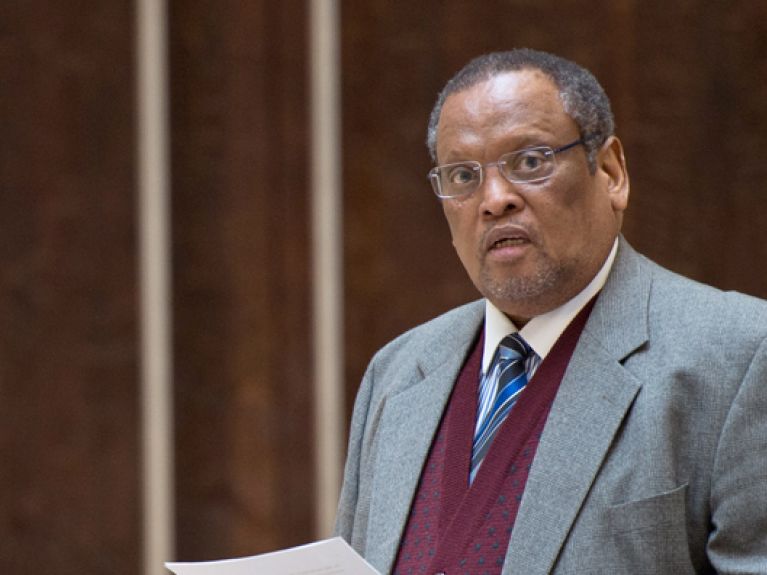“German reunification made us stronger”
South Africa’s ambassador to remembers Nelson Mandela and looks at German-South African relations.

Your Excellency, what are your memories of the day in 1990 on which Nelson Mandela was released from prison after 27 years of incarceration? Do you also remember how you experienced Germany’s reunification that same year?
During December 1989 I had been briefed in confidence by the ANC in Lusaka that Nelson Mandela was soon to be released from prison. When it was announced in parliament in February 1990, I was driving my car to East London. The news of the release so excited me that I was caught in a speed trap for driving too fast. I explained to the traffic police the cause of my excitement. They were so excited that they allowed me to proceed with my trip without a penalty. The whole country was mad with disbelief and excitement. When the Wall fell in 1989, it was clear to all who followed world politics that the reunification of Germany had started. The people themselves had started it and the governments had to formalise it.
How have German-South African relations evolved since 1990?
Politically, the West German government supported the apartheid regime, while the GDR supported the Liberation Movement. This changed dramatically as everybody now wanted to be seen to support the Liberation Movement. As a result of this, the first group of heads of state who visited the free South Africa were those who had supported apartheid, including Germany, France and the UK. We welcomed their change of attitude and desire to strengthen political ties. The Cold War had come to an end. With warming political relations, economic relations between Germany and South Africa also intensified. This naturally strengthened both Germany and South Africa economically. Many German companies had of course already done business in the apartheid South Africa since the nineteenth century. Now they have to learn new ways of partnering disadvantaged South Africans as we try to deracialise our country and create opportunities and equality for all. This is not easy, as the skeletons of apartheid continue to rattle in the economic cupboard following the many years of injustice. Political leaders of both countries must continue to work on this.
As South African ambassador, you experience the German capital at first hand – what particularly characterises Berlin nowadays?
The German capital city is a lovely place that is divided into different categories. The central part of Berlin is so integrated. Outsiders like me can hardly differentiate between what was East and what was West. With so many tourists, it is even more difficult to identify differences between people/individuals. They are all Germans. It is when you have pointed discussions and when you read the newspapers that the differences appear: wounds of the reunification process suffered by some public employees, concerns about too much investment in eastern German infrastructure, a hardening of attitudes (politically) and a gravitation to the right. This is not dissimilar to our situation at home. Change gives rise to unrealistic hope in some and to despair and alienation in others. Strong political leaders are needed to deal with such diverse expectations. Fortunately, Germany does have such leaders.

